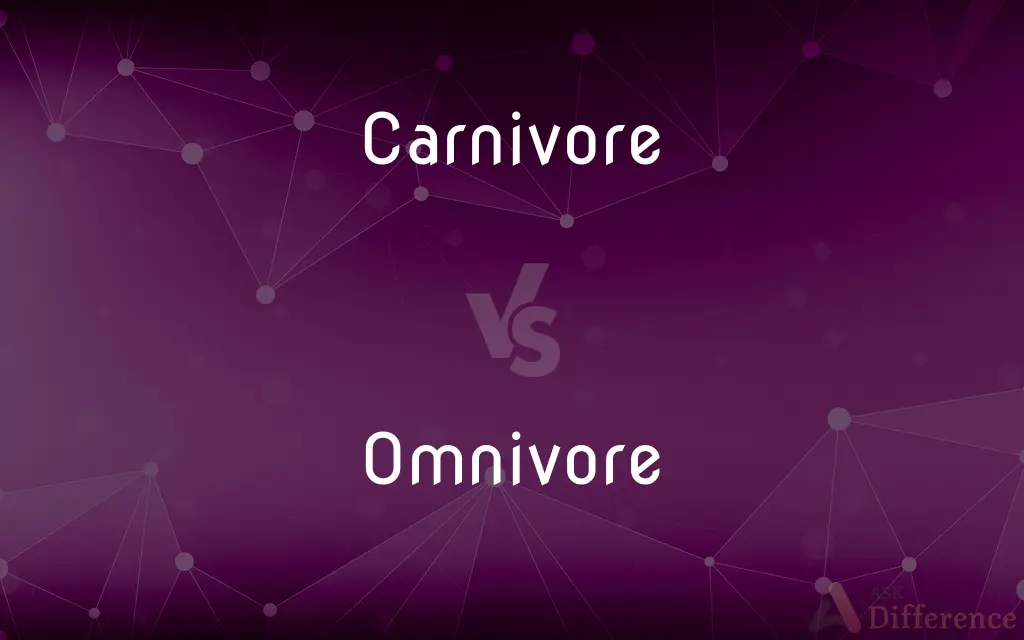Carnivore vs. Omnivore — What's the Difference?
By Tayyaba Rehman — Updated on October 25, 2023
"Carnivore" is an organism that primarily consumes animal flesh, while "Omnivore" is an organism that eats both plants and animals.

Difference Between Carnivore and Omnivore
Table of Contents
ADVERTISEMENT
Key Differences
A "Carnivore" is an animal that derives its energy and nutrients predominantly from the intake of animal tissue. In contrast, an "Omnivore" has a diet consisting of a variety of food sources, including both plants and animals.
The dietary habits of "Carnivores" are often specialized, focusing on hunting or scavenging animal prey. On the other hand, "Omnivores" display more flexibility, consuming fruits, grains, meat, and other diverse foods.
The anatomy of a "Carnivore" typically supports a meat-focused diet, with sharp teeth and claws. Conversely, an "Omnivore" has a more varied anatomy, often possessing both grinding and tearing teeth to process different food types.
Digestive systems also differ: "Carnivores" often have a shorter digestive tract suitable for metabolizing animal proteins and fats, while "Omnivores" possess a more adaptable digestive system to process a mixed diet.
While both "Carnivores" and "Omnivores" can be top predators in their respective ecosystems, the diversity in an omnivore's diet allows it to adjust better to environmental changes than a strict carnivore.
ADVERTISEMENT
Comparison Chart
Basic Diet
Primarily consumes animal flesh.
Eats both plants and animals.
Anatomical Adaptations
Sharp teeth and claws for tearing meat.
Combination of grinding and tearing teeth for varied diet.
Digestive System
Shorter tract, suited for animal proteins and fats.
More adaptable system for a mixed diet.
Dietary Flexibility
Specialized, primarily on animal prey.
Greater flexibility, consuming diverse foods.
Response to Environment
May struggle with drastic prey reductions.
Can adjust better to environmental changes due to varied diet.
Compare with Definitions
Carnivore
An organism adapted anatomically to consume animal tissue.
A Carnivore's sharp teeth are designed for tearing flesh.
Omnivore
A creature that possesses anatomical features for a mixed diet.
An Omnivore, the raccoon eats both insects and plants.
Carnivore
An animal that primarily eats meat.
Lions, as Carnivores, hunt other animals for food.
Omnivore
A species that can derive nutrients from both flora and fauna.
Being an Omnivore, the squirrel enjoys nuts as much as it does insects.
Carnivore
A member of the animal kingdom with a diet centered on meat.
As a Carnivore, the cheetah is an expert hunter.
Omnivore
An organism that consumes both plants and animals.
Humans are typically Omnivores, eating fruits, vegetables, and meats.
Carnivore
An animal that derives its energy chiefly from animal tissue.
Despite its size, a house cat is a Carnivore and prefers meat.
Omnivore
An animal with a diverse diet including both animal and plant matter.
Bears are Omnivores, eating berries and fish alike.
Carnivore
A species that feeds predominantly on other animals.
The eagle, being a Carnivore, swoops down to catch its prey.
Omnivore
An entity in the food chain consuming varied food sources.
Pigs, being Omnivores, can eat grains, fruits, and even small animals.
Carnivore
A carnivore , meaning "meat eater" (Latin, caro, genitive carnis, meaning "meat" or "flesh" and vorare meaning "to devour"), is an animal whose food and energy requirements derive solely from animal products (mainly muscle, fat and other soft tissues) whether through hunting or scavenging. Animals that depend solely on animal flesh for their nutrient requirements are called hypercarnivores or obligate carnivores, while those that also consume non-animal food are called mesocarnivores or facultative carnivores.
Omnivore
An omnivore () is an animal that has the ability to eat and survive on both plant and animal matter. Obtaining energy and nutrients from plant and animal matter, omnivores digest carbohydrates, protein, fat, and fiber, and metabolize the nutrients and energy of the sources absorbed.
Carnivore
Any of various mammals of the order Carnivora, including the dogs, cats, bears, weasels, raccoons, and seals, most of which are predatory flesh-eating animals.
Omnivore
An omnivorous animal
"Humans are quintessential omnivores" (Paul Rozin).
Carnivore
Any of various other flesh-eating animals.
Omnivore
One that takes in everything available, as with the mind.
Carnivore
An insectivorous plant.
Omnivore
An animal which is able to consume both plants (like a herbivore) and meat (like a carnivore).
Bears are omnivores: they can eat plants, but they also eat fish.
Carnivore
An organism that feeds chiefly on animals; an animal that feeds on meat as the main part of its diet.
As juveniles the crocodiles are frequently predated by larger carnivores.
Omnivore
A person who eats all kinds of foods
Carnivore
(zoology) A mammal belonging to the order Carnivora.
The panda and the panther are both carnivores.
Omnivore
An animal that feeds on both animal and vegetable substances
Carnivore
(informal) A person who is not a vegetarian.
Carnivore
A follower of the carnivore diet consuming only animal-based products, such as meat, eggs and dairy
Carnivore
One of the Carnivora.
Carnivore
Terrestrial or aquatic flesh-eating mammal; terrestrial carnivores have four or five clawed digits on each limb
Carnivore
Any animal that feeds on flesh;
Tyrannosaurus Rex was a large carnivore
Insectivorous plants are considered carnivores
Common Curiosities
Can Omnivores eat both plants and meat?
Yes, Omnivores eat a varied diet that includes both.
Are all Carnivores predators?
While many are, some Carnivores are scavengers.
Which diet offers more flexibility, Carnivore or Omnivore?
Omnivore diets are more flexible due to their varied nature.
Is a lion a Carnivore or an Omnivore?
A lion is a Carnivore.
Do Carnivores have longer digestive tracts?
No, Carnivores typically have shorter digestive tracts suited for meat.
Can an Omnivore survive solely on plants?
While possible, most Omnivores thrive best on a mixed diet.
How do Carnivores obtain essential nutrients?
They obtain them from the animal tissue they consume.
What's the main food source for a Carnivore?
Carnivores primarily consume animal flesh or meat.
Do Omnivores have a specific type of teeth?
Omnivores often have varied teeth, suited for both grinding and tearing.
Do Carnivores only eat live prey?
Not always. Some Carnivores also scavenge.
Are humans Carnivores or Omnivores?
Humans are generally considered Omnivores.
Can an Omnivore's diet change based on availability?
Yes, Omnivores can adjust their diet based on environmental resources.
Can a Carnivore ever eat plants?
While meat is their primary food, some Carnivores might occasionally consume plants.
Are all birds Carnivores?
No, while some birds are Carnivores, others might be Omnivores or herbivores.
Is a bear a strict Carnivore?
No, bears are Omnivores, eating a varied diet.
Share Your Discovery

Previous Comparison
Metaphor vs. Tenor
Next Comparison
Capitalisation vs. CapitalizationAuthor Spotlight
Written by
Tayyaba RehmanTayyaba Rehman is a distinguished writer, currently serving as a primary contributor to askdifference.com. As a researcher in semantics and etymology, Tayyaba's passion for the complexity of languages and their distinctions has found a perfect home on the platform. Tayyaba delves into the intricacies of language, distinguishing between commonly confused words and phrases, thereby providing clarity for readers worldwide.















































